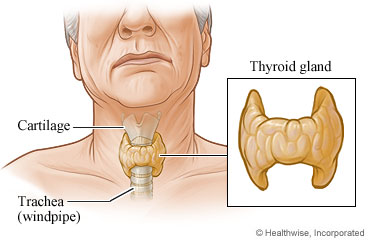
What is it?
A thyroid scan uses a radioactive tracer and a special camera. The tracer can be swallowed or can be injected into a vein. It travels through your body, giving off radiation signals. The camera "sees" the signals and can measure how much tracer the thyroid absorbs from the blood.
Why is this test done?
A thyroid scan is done to:
- Help find problems with the thyroid gland.
- Check a thyroid nodule.
- See whether thyroid cancer has spread outside the thyroid gland. A whole-body thyroid scan will usually be done for this evaluation.
How do you prepare for the test?
You may need to stop eating for several hours before the test. If the test is being done to check for thyroid cancer, you may have to eat a low-iodine diet for several days before the test. Your doctor may have you stop taking thyroid medicines for some time before this test.
If you are breastfeeding, you may want to pump enough breast milk before the test to get through 1 to 2 days of feeding. The radioactive tracer used in this test can get into your breast milk and is not good for the baby.
How is a thyroid scan done?
- The tracer used in this test is either radioactive iodine or technetium. You will either swallow a dose of iodine 4 to 24 hours before the scan. Or you may be given technetium in a vein (intravenously) in your arm 15 to 30 minutes before the scan.
- For the scan, you will lie on your back with your head tipped backward and your neck extended.
- A special camera takes pictures of your thyroid gland from three different angles.
- For a whole body thyroid cancer scan, the camera will scan your body from head to toes.
How long does the test take?
After you get the tracer, you may have a scan about 30 minutes later. Or you may need to return up to 24 hours later for one or more scans. Each scan takes only a few minutes.
What happens after the test?
- Most of the tracer will leave your body through your urine or stool within a day. So be sure to flush the toilet right after you use it, and wash your hands well with soap and water. The amount of radiation in the tracer is very small. This means it isn't a risk for people to be around you after the test.
- The radioactive tracer used in this test can get into your breast milk. Do not breastfeed your baby for 1 or 2 days after this test. During this time, you can give your baby breast milk you stored before the test, or you can give formula. Discard the breast milk you pump in the 1 or 2 days after the test.
- You can go back to your usual activities right away.
What are the risks of a thyroid scan?
Anytime you're exposed to radiation, there's a small chance of damage to cells or tissue. That's the case even with the low-level radioactive tracer used for this test. But the chance of damage is very low compared with the benefits of the test.
Follow-up care is a key part of your treatment and safety. Be sure to make and go to all appointments, and call your doctor if you are having problems. It's also a good idea to keep a list of the medicines you take. Ask your doctor when you can expect to have your test results.
Where can you learn more?
Go to http://www.healthwise.net/patientEd
Enter D897 in the search box to learn more about "Thyroid Scan: About This Test".
Current as of: July 31, 2024
Author: Ignite Healthwise, LLC Staff
Clinical Review Board
All Ignite Healthwise, LLC education is reviewed by a team that includes physicians, nurses, advanced practitioners, registered dieticians, and other healthcare professionals.

